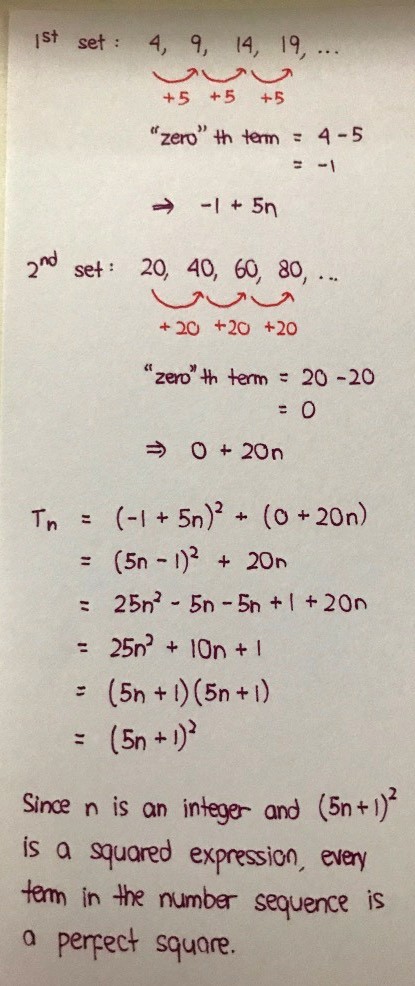Ask Singapore Homework?
Upload a photo of a Singapore homework and someone will email you the solution for free.

See 1 Answer
done
{{ upvoteCount }} Upvotes
clear
{{ downvoteCount * -1 }} Downvotes
For sequences with a constant difference, we can use the formula
Tn = (first term) + (n - 1) (constant difference)
Or
Tn = (“zero”th term) + n (constant difference).
The constant difference will take a negative value if the terms decrease in value.
Tn = (first term) + (n - 1) (constant difference)
Or
Tn = (“zero”th term) + n (constant difference).
The constant difference will take a negative value if the terms decrease in value.
Date Posted:
4 years ago
Thank you again! You are really helping the community. Everything is so clear! God bless you.
Looks like the question has been edited. A previous version of this question had the term 'odd perfect square' instead
For the squared part, the first term is just 4 + 0 times of 5, then squared.
4² = (4 + 5 x 0)² = (4 + 5 x (1 -1))²
9² = (4 + 5)² = (4 + 5 x 1)² = (4 + 5 x (2 - 1))²
14² = (4 + 10)² = (4 + 5 x 2)² = (4 + 5 x (3 - 1))²
19² = (4 + 15)² = (4 + 5 x 3)² = (4 + 5 x (4 - 1))²
The multiple is always 1 less than the term number.
For Tn, it would be :
(4 + 5 x (n - 1) )²
= (4 + 5n - 5)²
= (5n - 1)²
The constant is even easier. It is simply 20 times the term number.
20 = 20 x 1
40 = 20 x 2
60 = 20 x 3
80 = 20 x 4
For Tn, it would be : 20 x n = 20n
Combine both to get (5n - 1)² + 20n
4² = (4 + 5 x 0)² = (4 + 5 x (1 -1))²
9² = (4 + 5)² = (4 + 5 x 1)² = (4 + 5 x (2 - 1))²
14² = (4 + 10)² = (4 + 5 x 2)² = (4 + 5 x (3 - 1))²
19² = (4 + 15)² = (4 + 5 x 3)² = (4 + 5 x (4 - 1))²
The multiple is always 1 less than the term number.
For Tn, it would be :
(4 + 5 x (n - 1) )²
= (4 + 5n - 5)²
= (5n - 1)²
The constant is even easier. It is simply 20 times the term number.
20 = 20 x 1
40 = 20 x 2
60 = 20 x 3
80 = 20 x 4
For Tn, it would be : 20 x n = 20n
Combine both to get (5n - 1)² + 20n
For presentation, negative signs should not be placed as the first term if possible.
i.e 5n - 1 instead of -1 + 5n
Also note that n can only be a natural number or positive integer (whole number that is 1 or bigger), since the sequence starts from n = 1 and only increases from there.
The definition of integer as in general includes 0 and negative numbers.
Since n is a natural number, so will 5n be since it is a whole multiple of n.
Since smallest n is 1, it means smallest 5n = 5.
Smallest 5n + 1 is therefore 6 Since 5n increases as n increases, 5n + 1 also increases. 5n + 1 will therefore also be a natural number/positive integer.
(5n + 1)² is a perfect square since.it is a product of 2 equal integers
i.e 5n - 1 instead of -1 + 5n
Also note that n can only be a natural number or positive integer (whole number that is 1 or bigger), since the sequence starts from n = 1 and only increases from there.
The definition of integer as in general includes 0 and negative numbers.
Since n is a natural number, so will 5n be since it is a whole multiple of n.
Since smallest n is 1, it means smallest 5n = 5.
Smallest 5n + 1 is therefore 6 Since 5n increases as n increases, 5n + 1 also increases. 5n + 1 will therefore also be a natural number/positive integer.
(5n + 1)² is a perfect square since.it is a product of 2 equal integers






